|
|
|
Sort Order |
|
|
|
Items / Page
|
|
|
|
|
|
|
| Srl | Item |
| 1 |
ID:
165209
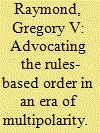

|
|
|
|
|
| Summary/Abstract |
Faced with eroding United States hegemony and the rise of a more multipolar distribution of global power, Australia has embraced a new foreign policy platform built around advocacy for a ‘rules-based global order’. In this essay I first argue that the emerging characterisation of multipolarity overemphasises the centrality of the United States and overlooks the legacies of Asian colonisation, decolonisation, state-building and local norm development. I then consider the reasons for the embrace of the rules-based global order construct, locating it as an instinctive reaction to issues arising from the South China Sea dispute, the raw use of power, and the inclination to share the ideas of a close ally. I note, however, that linking Australia closely with the United States approach to global rules has drawbacks, given the United States’ explicit attempts to reserve a right to use force outside the UN Charter. I suggest that Australia would be better served by clearly delineating a separation between its military alliance with a United States, a policy for worst-case scenarios, from its support for international law and institutions, which should form the mainstay and leading edge of its foreign policy.
|
|
|
|
|
|
|
|
|
|
|
|
|
|
|
|
| 2 |
ID:
126586


|
|
|
|
|
| Publication |
2013.
|
| Summary/Abstract |
Using the 'achievement index', a country's relative size of gross domestic product divided by its relative size of population, I argue that the high-achieving position of the West, as a structural distortion, has been a principal source of instability in the modern international system. Rather than being just unsatisfied great powers, large high achievers and stagnant low achievers engage in hegemonic and counter-hegemonic warfare, respectively. Both hierarchy and balancing systems are structurally more stable if they are 'natural' and less stable if they are 'unnatural', with being natural defined as an achievement index of 1. The rise of the rest constitutes a long-term trend back to nature, beginning to flatten the heretofore skewed international structure, which lessens one source of modern system-level instability. With a much larger share of world population, China cannot rise to the same relative height as the West that rose with a much smaller share of the population. China's rise is thus unlikely to repeat the past experience of the rising West.
|
|
|
|
|
|
|
|
|
|
|
|
|
|
|
|
| 3 |
ID:
172380
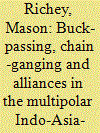

|
|
|
|
|
| Summary/Abstract |
Christensen’s and Snyder’s neorealist-based theory of buck-passing and chain-ganging uses offence-defence balance to predict state security policy choices under multipolarity. This approach is applicable to the US-led alliance system in the multipolar Indo-Asia-Pacific. Given regional Sino-US rivalry, hedging opportunities for US ‘hub-and-spoke’ allies will dissipate, increasing the likelihood of allies choosing to buck-pass or chain-gang in the face of conflict. With defence superior in the region, it is more likely that US allies will buck-pass rather than chain-gang. Beyond Indo-Asia-Pacific states, this has implications for global actors – such as the EU – seeking to raise their security profile in the region, as buck-passing behaviour gives greater time to adjust to potential conflict scenarios than chain-ganging.
|
|
|
|
|
|
|
|
|
|
|
|
|
|
|
|
| 4 |
ID:
120785
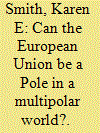

|
|
|
|
|
| Publication |
2013.
|
| Summary/Abstract |
Can the EU serve as a pole in a multipolar, interdependent international system? The EU will face three particular challenges operating in such a system: the challenge of re-establishing credibility after the euro crisis; the ever-present challenge of achieving unity among the member states; and the challenge of adapting foreign policy behaviour to match the new international environment. There is a risk that the EU could slide into irrelevance.
|
|
|
|
|
|
|
|
|
|
|
|
|
|
|
|
| 5 |
ID:
151595
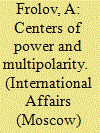

|
|
|
|
|
| Summary/Abstract |
IN 1983, VLADIMIR LUKIN* brought out a book that became a landmark not only for the Institute for the U.S. and Canadian Studies of the Soviet Academy of Sciences, where he worked at that time, but for the entire Soviet scholarly community. It was per se remarkable that the book, entitled Centers of Power: Concepts and Realities, was published at a time when, let me remind you, the Soviet-American confrontation and the rivalry between the two world systems reached their peak and, let's face it, each system professed an ideology that essentially painted a black-and-white picture of the world and claimed to be superior to the other system. Few people could have thought in those days that that state of affairs could come to an end any time soon. The United States was getting ready for a grueling struggle with the Soviets. Almost nobody in either country thought that any third party would ever come forward and throw down the gauntlet to the world's two superpowers. Each system was getting ready for its own historic victory and saw the rest of the world as so many pieces on the chessboard.
|
|
|
|
|
|
|
|
|
|
|
|
|
|
|
|
| 6 |
ID:
174543
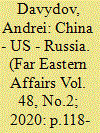

|
|
|
|
|
| Summary/Abstract |
This article describes the recent events in the relations between China, the United States, and Russia (the "Big Three" in the struggle to shape a new world order), their role and potentialities in the process under conditions of the raging coronavirus pandemic, and the development prospects for their relations in the foreseeable future.
|
|
|
|
|
|
|
|
|
|
|
|
|
|
|
|
| 7 |
ID:
080628
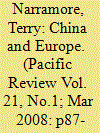

|
|
|
|
|
| Publication |
2008.
|
| Summary/Abstract |
Ever closer relations between China and Europe over the last decade have sparked speculation about an emerging axis or balance of power vis-à-vis the United States. China, the European Union and its key member states have expressed a preference for a more balanced international order based on multilateral institutions. Despite a rapid and extensive expansion in economic and political relations between China and the European Union, there is no evidence for balancing against the United States in strategic areas. Rather, the variations in the positions of China, the European Union and the United States can more accurately be seen as policy or interest bargaining. Because the European Union does not share US security interests in the Asia-Pacific region, the European Union and its key member states can seem at variance with the US position on China. Bargaining over the failed attempt to lift the European Union's arms embargo against China shows that the European Union and the United States are not so far apart on strategic issues in the Asia-Pacific.
|
|
|
|
|
|
|
|
|
|
|
|
|
|
|
|
| 8 |
ID:
077212
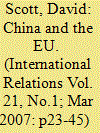

|
|
|
|
|
| Publication |
2007.
|
| Summary/Abstract |
The EU-China relationship is now emerging as a significant feature of the international system. The EU's institutional consolidation, development of supranational trade power and the foreign policy openings of the Common Foreign and Security Policy (CFSP) has entwined with the PRC's ongoing sense of geopolitical manoeuvrings between the superpowers. With its talk of 'multipolarity', grand strategy has converged, though the PRC's stress on 'multipolarity' can perhaps be distinguished from the EU's stress on 'multilateralism'. Nevertheless, human rights issues apart, the EU-China relationship has matured in the last two decades to involve significant economic matters and visions of a wider 'strategic partnership', bringing with it a challenge to American unipolar unilateralism
|
|
|
|
|
|
|
|
|
|
|
|
|
|
|
|
| 9 |
ID:
142627
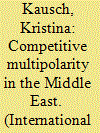

|
|
|
|
|
| Summary/Abstract |
The Middle Eastern and North African region is in flux and attempts to identify a new dominant structural logic have been limited so far. For the time being, the new “order” appears to consist in the absence of any one clear-cut organising principle and in overlapping, dynamic, often contradictory geopolitical developments. Among many other features, the geopolitical equation in the Middle East is being altered by a number of larger structural shifts regarding the position and relative weight of specific actors. Notable instances include the relative loss of influence of the United States and Europe; the game-changing regional roles of Russia and China, respectively; the resurgence of Iranian-Saudi rivalry; the emergence of a number of regional ‘swing states’; and the increasing role of non-state actors in shaping regional developments. The complexity of this outlook makes policy choices by regional and external actors ever more difficult.
|
|
|
|
|
|
|
|
|
|
|
|
|
|
|
|
| 10 |
ID:
145693
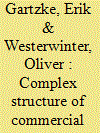

|
|
|
|
|
| Summary/Abstract |
Researchers continue to debate the impact of trade on interstate conflict. While many view trade as pacifying, others argue that dependencies increase friction and the risk of war. We provide a theory that explains how cross-border economic ties alternately enhance or impede international cooperation. Three main factors account for the heterogeneous effects of trade on conflict: interdependence, asymmetry, and multipolarity. Interdependence can act as a substitute for, or as a deterrent to, militarized violence. In the former case, interdependence actually increases more modest non-militarized conflict, while also discouraging militarized disputes. Asymmetry diminishes the conflict-inhibiting effect of trade ties, as dependency cannot simultaneously be used to coerce and to inform. Multilateral trade networks alternately moderate or enhance the bilateral effects of interdependence and asymmetry on interstate peace. Our theory and evidence reveal complex, cross-cutting consequences of economic interdependence on conflict behavior and also demonstrate effects well beyond the dyad, suggesting the need to include extradyadic ties in future theoretical and empirical research studying the commercial peace.
|
|
|
|
|
|
|
|
|
|
|
|
|
|
|
|
| 11 |
ID:
188610
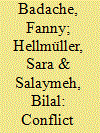

|
|
|
|
|
| Summary/Abstract |
This article examines how major powers conceive the role of the United Nations (UN) in peacebuilding. We conceptualize the UN’s role along the distinction between conflict management and conflict resolution and distinguish between the types of tasks and the approach the UN can adopt. We map states’ conceptions of the UN’s role in peacebuilding by coding peace-related speeches at the UN Security Council (1991–2020) delivered by China, France, Russia, the United Kingdom, the United States as well as Brazil, South Africa, and Turkey as rising regional powers. Our findings show that states’ conceptions differ regarding the type of tasks the UN should do. However, the main fault line between the countries lie in the approach the UN should adopt to conduct peacebuilding tasks. We conclude that major powers see a role for the UN beyond mere conflict management as long as it is done with respect for national sovereignty.
|
|
|
|
|
|
|
|
|
|
|
|
|
|
|
|
| 12 |
ID:
195015


|
|
|
|
|
| Summary/Abstract |
Years of increasingly authoritarian rule and economic mismanagement by President Nicolás Maduro have turned Venezuela into a source of regional instability. The European Union’s (EU) main foreign policy objective towards the country has been a peaceful transition to free and transparent elections and its re-introduction into regional and global trade and political frameworks. The strategies pursued by the EU to mitigate the constraints on its foreign policy towards Venezuela have helped to bring about more EU unity, but have failed to have a significant impact in the country itself. Multipolar competition between the EU and the United States (US) on the one hand and between the People’s Republic of China (PRC) and Russia on the other, have undermined the EU’s attempts to contribute a peaceful solution to the process. Most recently, the war on Ukraine has created a new dilemma for the EU in its dealings with Venezuela, that is, having to navigate between maintaining pressure on the Maduro regime, keeping up momentum for negotiations and deciding whether to follow the US in resuming oil trade with Caracas to mitigate the energy crisis in Europe.
|
|
|
|
|
|
|
|
|
|
|
|
|
|
|
|
| 13 |
ID:
130892
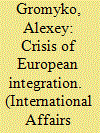

|
|
|
|
|
| Publication |
2014.
|
| Summary/Abstract |
Today, multipolarity and polycentrism are quantitatively and qualitatively different from their "prototypes" of historical periods of the past. Here it is necessary to single out three moments. First, Euro-centrism has been fading away in the past 20 years. Up to the 20th century, all the "concerts of powers" were based on the leading role of European states in international relations. Secondly, this new polycentrism is moving away from the straightforward dominance of the principle of force. The third moment, which characterizes the new-style multipolarity, is a phenomenon of international law that we have inherited from the 20th century.
|
|
|
|
|
|
|
|
|
|
|
|
|
|
|
|
| 14 |
ID:
085136
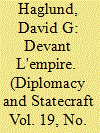

|
|
|
|
|
| Publication |
2008.
|
| Summary/Abstract |
Many observers of contemporary French politics would find it difficult to resist the temptation to conclude that France, alone among the European allies of the United States, has consistently had the greatest difficulty in adjusting to the reality of America's power. When that power occasions, as it frequently does, debates about "American empire," French opposition to American influence seems to become even more pronounced. In fact, there has in recent decades been a distinctive French negative assessment of the merits of American empire, but it would be a mistake, or so this paper argues, to assume that French interests have invariably been at odds either with American power or with American empire. Using four eponymous figures to illustrate the French perspective on American empire in the past 100 years, this essay highlights how and why that assessment has evolved.
|
|
|
|
|
|
|
|
|
|
|
|
|
|
|
|
| 15 |
ID:
145121
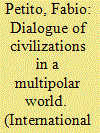

|
|
|
|
|
| Summary/Abstract |
In this article, I explore the relationship between the new multipolar trends related to the emerging powers and the idea of dialogue of civilizations. My starting point is to understand multipolarity as part of a broader epoch making process of transformation of contemporary international society beyond its Western-centric matrix. In the first part of this article, I therefore argue for an analytical understanding that emphasizes the emergence of a new multipolar world of civilizational politics and multiple modernities. In the second part of the article, I reflect on how to counter the risk inherent in the potential antagonistic logic of multipolarity by critically engaging the normative Huntingtonian construction of a multicivilizational-multipolar world order. I argue that the link between dialogue of civilizations and regionalism could represent a critical issue for the future of global peace. In particular, multiculturally constituted processes of regional integration are antidotes to the possible negative politicization of cultural differences on a global scale and can contribute to the emergence of a new cross-cultural jus gentium. These elements are critical to the construction of a realistic dialogue of civilizations in international relations while preventing the risks inherent in its growing multipolar configuration. They shape what, drawing on Amitav Acharya's work, could be named a multicivilizational-multiplex world order.
|
|
|
|
|
|
|
|
|
|
|
|
|
|
|
|
| 16 |
ID:
158383
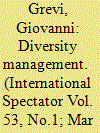

|
|
|
|
|
| Summary/Abstract |
The ongoing redistribution of power on the international stage points to a more decentred international system featuring a multiplication of governance arrangements. A larger range of pivotal countries have the capacity and the confidence to pursue different priorities, a development that questions the prevalent post-Cold War expectation that the liberal international order would grow both wider and deeper. The central challenge for the future of the international order is managing diversity in ways that minimise conflict and leverage the benefits of interdependence. The evolution of regionalism and regional orders will be a critical dimension of the realignment of power, interests and normative agendas at the global level. Both more competition and more cooperation are likely to take place at the regional level, with the mix changing in different parts of the world. Provided that it is not merely a cover for coercive hegemonic aspirations and that it is designed to complement other levels of cooperation, regionalism can play an important role in preventing a more polycentric world from becoming a more fragmented and unstable one.
|
|
|
|
|
|
|
|
|
|
|
|
|
|
|
|
| 17 |
ID:
185994
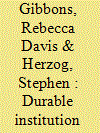

|
|
|
|
|
| Summary/Abstract |
The regime built around the 1970 Treaty on the Non-Proliferation of Nuclear Weapons (NPT) has helped curtail the spread of nuclear arms for fifty years. In hindsight, it is remarkable only nine states possess the world’s most powerful weapon. The NPT achieved much success during Cold War bipolarity and U.S. unipolarity in its aftermath. But today, China’s rise and Russia’s resurgence have ushered in a new era of emerging multipolarity. Can the treaty withstand the potential challenges of this dynamic environment? There is a real risk that multipolarity may shake the scaffolding of the nonproliferation regime, presenting a significant test to the NPT’s durability. This article identifies four essential elements of the nonproliferation regime: widespread membership, adaptability, enforcement, and fairness. History suggests bipolarity and unipolarity in the international system largely sustained and promoted these NPT features. When international regimes lack such elements, it sharply curtails their long-term efficacy.
|
|
|
|
|
|
|
|
|
|
|
|
|
|
|
|
| 18 |
ID:
107991
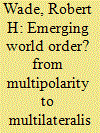

|
|
|
|
|
| Publication |
2011.
|
| Summary/Abstract |
Many developing and transitional countries have grown faster than advanced countries in the past decade, resulting in a shift in the distribution of world income in their favor. China is now the second largest economy in the world, behind the United States and ahead of Japan. As the relative economic weight of China and several others has come to match or exceed that of the middle-ranking G7 economies, the world economy has shifted from "unipolar" toward "multipolar," less dominated by the G7. How is this change being translated into changes in authority and influence within multilateral organizations like the G20, the World Bank, and the International Monetary Fund (IMF)? Alarm bells are ringing in G7 capitals about G7 loss of influence. According to a WikiLeaks cable from the senior U.S. official for the G20 process, from January 2010, "It is remarkable how closely coordinated the BASIC group of countries [Brazil, South Africa, India, China] have become in international fora, taking turns to impede US/EU initiatives and playing the US and EU off against each other."
This essay suggests that the shift in power is much smaller than the headlines or private alarm bells suggest. The United States remains the dominant state, and the G7 states together continue to exercise primacy, but now more fearfully and defensively. China is split between asserting itself as "the wave of the future" and defending itself as too poor to take on global responsibilities (it is roughly 100th in the per capita income hierarchy). The combination of G7 defensiveness and emerging states' jealous guarding of sovereignty produces a spirit of Westphalian assertion in international fora, or "every state for itself." On the assumption that the world economy is in a transitional period, the article suggests reforms in the G20 and the World Bank that would boost their role and legitimacy as multilateral organizations in a more multipolar world.
|
|
|
|
|
|
|
|
|
|
|
|
|
|
|
|
| 19 |
ID:
175954
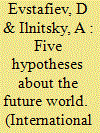

|
|
|
| 20 |
ID:
169566
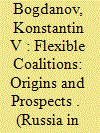

|
|
|
|
|
| Summary/Abstract |
The beginning of the 21st century was marked by the growing popularity of the idea that flexible military-political coalitions built for concrete tactical tasks had certain advantages over long-term strategic alliances. This strategy was actively pursued on the international stage by the George W. Bush administration during its first term (largely owing to Defense Secretary Donald Rumsfeld’s efforts) due to mounting contradictions caused by the transformation of the world order and the changing place and role of the United States in it. The U.S. gave up the concept of collective approval for external interference and stepped up unilateral actions. As existing collective security institutions become increasingly plagued with problems, flexible coalition strategies gain more popularity as evidenced not only by U.S. actions but also by those of Russia
|
|
|
|
|
|
|
|
|
|
|
|
|
|
|
|
|
|
|
|
|